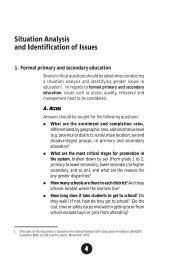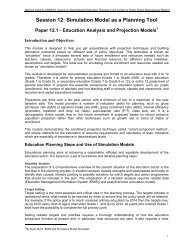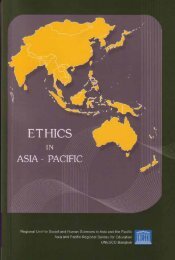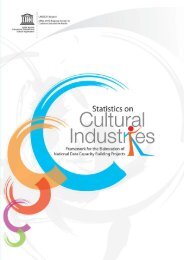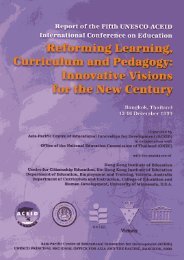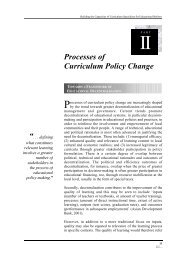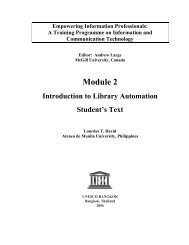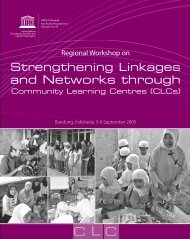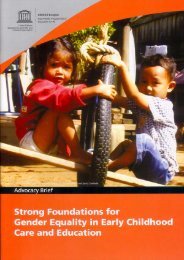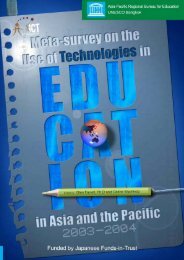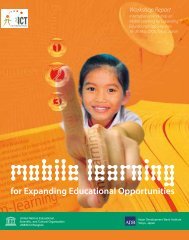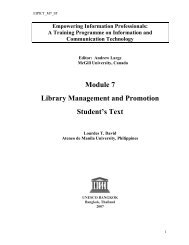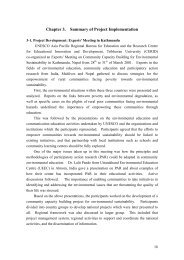Each province in Pakistan nominated four learning coordinators to attenda two-day workshop organized and led by staff from the FederalDirectorate of Education and the Allama Iqbal Open University. Eachlearning coordinator was informed that they would be responsible fortraining of teachers from 10 to 20 schools. The project provided teachersfrom multi-grade schools with training in self-learning strategies andquality improvement. In addition teachers learned strategies forincreasing contact time with students.ContactMr Md Yusaf Chosan, Primary and Non-Formal Education Wing, Ministry ofEducation, Shaheed-I-Millat Secretariat, Islamabad, Pakistan, Tel: 920-2708, Fax: 921-737.32. Multi-grade Teaching ProjectThere are more than 3000 teachers working in primary schools of theDistrict of Islamabad, Pakistan. There is no regular and systematicmechanism for their in-service training. A baseline survey indicated anurgent need for such training among teachers of multi-grade schools,particularly concerning strategies for mobilizing community participation.Lack of community involvement stems from the perception ofdifferent roles and responsibilities. Villages accept responsibility forproviding land and for constructing the school, but see teacher training asthe responsibility of government.This project, which began in 1993, is administered by the FederalDirectorate of Education, Ministry of Education, and is supported byUNICEF. It aims to develop in-service education to improve teachercompetency and to strengthen links with school communities. Twomulti-grade teaching workshops were conducted by the Adult BasicEducation Society in collaboration with UNICEF. An outcome of thefirst workshop was the development of a model activity-based classroomin the school of each participant (teachers from 25 existing and 10 newmulti-grade schools). These model classrooms were monitored byproject staff and specific needs were identified which served as the basisfor the second workshop. An impact evaluation by UNICEF and a teamfrom Quid-e-Azam University found a shift to group work among all themulti-grade teachers participating. Most classrooms were brightlydecorated, seating arrangements were varied and learning activities morecommon. In many classrooms teachers were no longer reading to theclass from a textbook but using teaching aids such as charts, pictures,models and work cards. At the same time many teachers reported thatList of Projects by Countrytheir crowded and cramped classrooms made the introduction of activity-List of Projects by Country © 55
List of Projects by Countrybased learning impractical, if not impossible. The new method ofteaching was also perceived to be slower than traditional methods, andthe lengthy syllabus prescribed was incompatible with project objectives.Village Education Committees were also established for each projectschool. Their responsibilities included increasing enrolments, generatingresources and assisting teachers in the efficient and effective managementand functioning of the school.The project produced a fortnightly newsletter entitled HAMARIDUNYA,which contained project information, and news and information aboutlocal areas and schools. Its role was to encourage all parties to focus onthe status of education.ContactEdwin Samson, Ministry of Education, Shaheed-I-Millat Secretariat, Islamabad,Pakistan.33. Punjab Middle Schooling ProjectThe Punjab Middle Schooling project in Punjab province, Pakistan, isfunded to USD$100 million by a World Bank loan, and has a grant fromUK of 4.5 million pounds sterling. It began in January 1994 and will endin 2000, although a one-year extension is possible.The project aims to promote access to education through building 300new schools and rehabilitating 2,100 existing ones, and to improve thequality of education through institutional capacity building, teacher andhead teacher training and the production of educational materials. Afurther aim is to promote equity - gender, ethnic and religious, rural andurban. It operates through such Ministry of Education agencies as theDirectorate of Staff Development (DSD) and the Curriculum Researchand Development Centre (CRDC). The project is to be seen in the contextof the overarching Social Action Programme II, which coordinatesinitiatives in health, population, education, water supply and sanitation.The project is on track to fulfil its material objectives. A comprehensivetraining programme for teachers of mathematics, science and English,and for head teachers, is being provided by DSD, and teacher self-supportmaterials are being developed, targeted at areas of need identified byteachers. At CRDC a Test Development Centre has been established toimprove techniques in testing and assessment, especially item banks ofobjective tests. Working in partnership with local publishers 132 fictionand non-fiction supplementary readers have been developed anddistributed. The project’s book design unit prepares camera-ready copyof existing local texts, texts generated locally through literary56 © Snapshots of Primary and Secondary Education in Asia-Pacific
- Page 5 and 6:
P r e f a c eIn responding to the m
- Page 7 and 8:
List of AbbreviationsACEIDADBAECAPE
- Page 9 and 10:
C O N T E N T SPrefaceList of Abbre
- Page 11 and 12:
Pakistan28. In-service Teacher Educ
- Page 13 and 14: Projects from 14 countries are incl
- Page 15 and 16: ability to make a regional contribu
- Page 17 and 18: and this became a foundation stone
- Page 19 and 20: systematic and sustained way for mu
- Page 21 and 22: ReferencesACEID (1998), ACEID News,
- Page 23 and 24: project in Higher Secondary Educati
- Page 25 and 26: Models of Educational InnovationA d
- Page 27 and 28: was clearly a main goal of the cons
- Page 29 and 30: Innovation in primary and secondary
- Page 31 and 32: Schwab, J (1969), The practical: A
- Page 33 and 34: List of Projects by CountryRelation
- Page 35 and 36: List of Projects by CountrySince 19
- Page 37 and 38: List of Projects by CountryThe proj
- Page 39 and 40: CHINAList of Projects by Country7.
- Page 41 and 42: List of Projects by Countrydealing
- Page 43 and 44: ContactDr R Govinda, National Insti
- Page 45 and 46: List of Projects by Countryand Trai
- Page 47 and 48: List of Projects by Countryeducator
- Page 49 and 50: List of Projects by Countryteaching
- Page 51 and 52: List of Projects by CountryTo suppo
- Page 53 and 54: Workplace training involves the app
- Page 55 and 56: MALDIVESList of Projects by Country
- Page 57 and 58: List of Projects by CountryThis UNI
- Page 59 and 60: 26. Secondary Education Development
- Page 61 and 62: Simpson, M (1998), Student support
- Page 63: List of Projects by Countryeducatio
- Page 67 and 68: List of Projects by CountryThe low
- Page 69 and 70: Elementary Lead Schools of DECS. Su
- Page 71 and 72: Dr Alberto P Mendoza, Director IV,
- Page 73 and 74: ContactSoledad A Ulep, Institute fo
- Page 75 and 76: List of Projects by Countryhalls or
- Page 77 and 78: NOTES ON CONTRIBUTORSPhilip Bergstr
- Page 79 and 80: • rural 4, 10, 30, 34, 35, 36•



